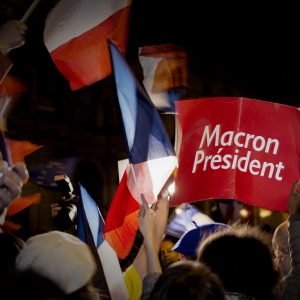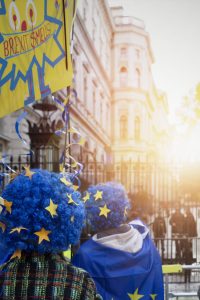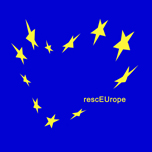
November 06th, 2017, 22:31 pm
Barcelona says no to secession
The phantom pain of many Catalans to be centrally dictated by fascists from Madrid is first reliefed by the announcement of the controversial referendum on the renunciation of dominion for October 01, 2017.
The process for the independence referendum that Artur Mas, predecessor of Carles Puigdemont at the head of the Catalan regional government, initiated in 2010, had been cleverly reinforced by Puigdemont in both the media and rhetorically. Both link the alleged vacuum of democracy in which Catalonia finds itself through the centralistic rule of Madrid with the problems with which the region – like the rest of Spain – is still confronted today after the world economic crisis.
The majority of Catalans do not believe that Spain is under fascist rule
This brute decoupling of cause and effect of an economic imbalance caused by a long lasting recession leads especially young Catalans to the apparent realization that their own future can only be saved if the region liberates itself from the despotism of Madrid.
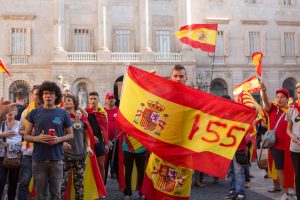
The vast majority of Catalans, however, no longer feel the pain that Puigdemont and his cross-party alliance for secession, Junts pel Sí, are currently activating. It is the result of the wounds suffered by their fathers and grandfathers against the truly fascist Franco regime during its 40-year reign from 1936 to 1975. Having arrived in the Europe of the 21st century, it is difficult for them to recognize a fascist ruler in the current prime minister. Their self-image is marked by liberal democratic convictions, which they see realized in Europe today.
It seemed for a while that the opponents of Catalonia’s secession were taken by surprise by the pace set in the process by the Independendistas. In any case, they first had to realize why the movement is being driven forward with such vehemence and unconditionality right now. And what interests? The political, economic and social upheavals that will result are not yet foreseeable.
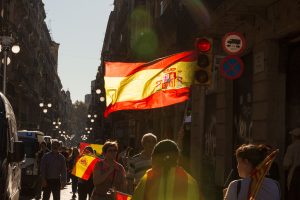
The day after the declaration of independence, it was strangely quiet in Barcelona. As usual, thousands of tourists went through the common sightseeing spots of the city. At the facades of the houses, sometimes the Catalan Estelada fluttered, sometimes the Rojigualda, the Spanish flag. In front of the Generalitat de Catalunya at the Plaça de Sant Jaume, the official seat of Puigdemont, international camera teams were set up – for all cases. And even in front of the Catalan parliament near the zoo there were only a few cameramen left who prepared themselves for eventualities – that did not happen – with light tests.
Hundreds of thousands can be mobilized for “Juntos” – Together
A procession of members of the military of the North Moroccan Rif region, who lamented the still strong militarization of their region since the end of the Rif wars against Spain in the early 20th century, appeared in front of the Generalitat later that Saturday. They waved the Moroccan flag, as well as the Catalan independence one and the Berber flag.
It was Sunday when the streets were flooded by Spanish red and yellow again. For this day the opponents of the independence movement had announced a rally on the Passeo de Graçia, a magnificent boulevard which flows at its southern end into the Plaça Cataluya. It was to be one of the biggest rallies the city had ever seen. At last they had found the strength to stand up, break the silence of the majority and mobilize hundreds of thousands for a clear: JUNTOS – Together!
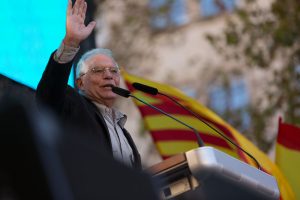
Speakers included Josep Borrell, President of the European Parliament 2004-2007, former Foreign Minister of the ruling party Partido Popular, Josep Piqué and Paco Frutos, former Secretary General of the Spanish Communists. They all spoke out against totalitarianism, paternalism and the denunciations of the Coalition of Separatists, for whom everyone is a fascist who doesn`t agree with them.
To thunderous applause and waving Spanish, European and Catalan flags, they claimed to build more bridges and fewer walls, songs were sung that conjured up the unity of Spain. Carles Puigdemont and the local TV station TV3 were insulted as manipulators who would get their receipts at the ballot boxes on 21 December.
Where national flags fly, neo-Nazis are often not far away. So was it here. However, the fifty neo nazis who came, were kindly absorbed and well digested by the sheer mass of the cosmopolitan pro-Europeans. And so in the end it was a dazzling, loud and enthusiastic celebration for the power of the unity of Spain.



